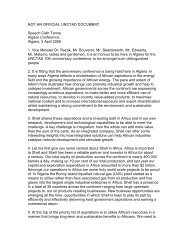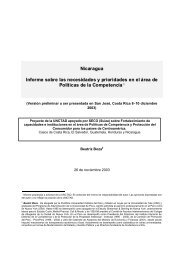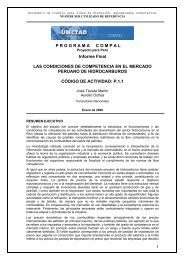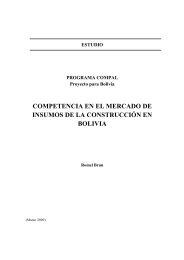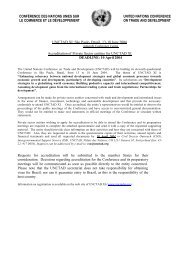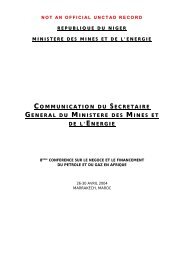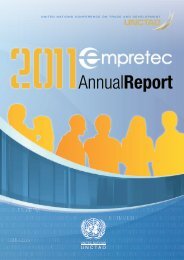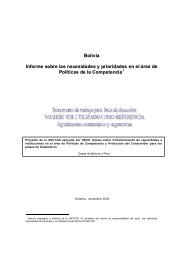Empretec Women in Business Award 2012 publication - Unctad XI
Empretec Women in Business Award 2012 publication - Unctad XI
Empretec Women in Business Award 2012 publication - Unctad XI
- No tags were found...
You also want an ePaper? Increase the reach of your titles
YUMPU automatically turns print PDFs into web optimized ePapers that Google loves.
THOUGHTS FROM EXPERTS36The case for women’s entrepreneurship has never been strongerBy Anthony A. GribbenSenior Expert, European Tra<strong>in</strong><strong>in</strong>g FoundationDebt, deficits, and decl<strong>in</strong><strong>in</strong>g employment have dom<strong>in</strong>ated the economic headl<strong>in</strong>es s<strong>in</strong>ce 2008. Therehas been talk for years, especially <strong>in</strong> the West, about giv<strong>in</strong>g women a greater role <strong>in</strong> the world economy.Now seems a good time to do someth<strong>in</strong>g about it. <strong>Women</strong>’s entrepreneurship has great potential. If somepractical steps are taken, this vastly underused human resource can f<strong>in</strong>ally be tapped to generate newbus<strong>in</strong>ess and new jobs, mak<strong>in</strong>g a susta<strong>in</strong>ed contribution to a global economic turnaround.In the bid for quick fixes to the economy and joblessness, women’s entrepreneurship cannot be allowed to be some k<strong>in</strong>d of “crisis displacement”only to be pushed down the policy agenda when the world economy eventually picks up. It needs to be firmly embedded <strong>in</strong>to economic policyand to stay there. Bus<strong>in</strong>esses and civic <strong>in</strong>terest groups should keep the issue on the radar as governments cope with restricted spend<strong>in</strong>g and themany socio-economic challenges brought on by the l<strong>in</strong>ger<strong>in</strong>g global economic malaise.Creat<strong>in</strong>g circumstances that enable women to establish and expand bus<strong>in</strong>esses should not be clouded by the wider discussion of “gender equity”issues. <strong>Women</strong>’s entrepreneurship is first and foremost an economic issue. It is important for national economies as well as the global economy,and should therefore have a dedicated space <strong>in</strong> government and <strong>in</strong>ternational debate. If it is located with<strong>in</strong> the wider discourse on the political andsocial challenges fac<strong>in</strong>g women, it risks be<strong>in</strong>g diluted or returned to the back burner. Each of the barriers frustrat<strong>in</strong>g women from realiz<strong>in</strong>g theirpotential as entrepreneurs needs to be s<strong>in</strong>gularly addressed. These <strong>in</strong>clude access to f<strong>in</strong>ance, taxation issues, provision of tra<strong>in</strong><strong>in</strong>g, mentor<strong>in</strong>g andwider bus<strong>in</strong>ess support services, as well as child care. A multi-policy approach is needed. That can be a complex undertak<strong>in</strong>g, but it is certa<strong>in</strong>lypossible assum<strong>in</strong>g there is the right economic vision and political will. Cherry-pick<strong>in</strong>g policy areas or approach<strong>in</strong>g the obstacles half-heartedlywill be counterproductive.In addition, the extensive attention given to date to “necessity” entrepreneurship among women – that is, a focus on micro-enterprise developmentand self-employment – should be re<strong>in</strong>forced with much greater focus on “opportunity” entrepreneurship. This concentrates on women’s start-upsand growth enterprises which are more able to contribute to susta<strong>in</strong>able and competitive economies as well as employment. It is these enterprisesthat will generate the much-needed momentum for national economies to recover from the economic downturn. The ongo<strong>in</strong>g disruption of theglobal economy may have created the best opportunity yet for women’s entrepreneurship to be taken seriously by policymakers. A more gendersensitiveentrepreneurship policy framework will pay off <strong>in</strong> terms of more and better bus<strong>in</strong>esses and more and better jobs. If governments and theprivate sector are serious about gett<strong>in</strong>g their economies back on track, the tim<strong>in</strong>g has never been better for such an <strong>in</strong>tegrated policy approachto women’s entrepreneurship to be adopted at all levels – local, national and <strong>in</strong>ternational. The challenges will be many. Shar<strong>in</strong>g of experienceand good practice will help here.Anthony Gribben is a senior expert on entrepreneurship at the European Tra<strong>in</strong><strong>in</strong>g Foundation (ETF). The ETF supports the EuropeanCommission <strong>in</strong> promot<strong>in</strong>g human capital development <strong>in</strong> the EU’s pre-accession, Southern Mediterranean and Eastern neighbourhood regions,<strong>in</strong>clud<strong>in</strong>g the countries of Central Asia. ETF’s work on entrepreneurship <strong>in</strong>cludes <strong>in</strong>dicators to promote more gender-sensitive policies (for example,on entrepreneurship policy, tra<strong>in</strong><strong>in</strong>g, network<strong>in</strong>g and access to f<strong>in</strong>ance) <strong>in</strong> its partner countries. In addition, the ETF provides a global policy watchon female entrepreneurship as part of its good-practice dissem<strong>in</strong>ation mandate.



